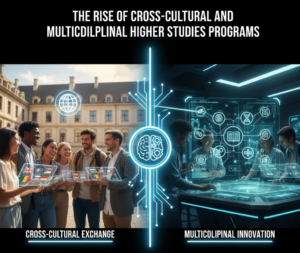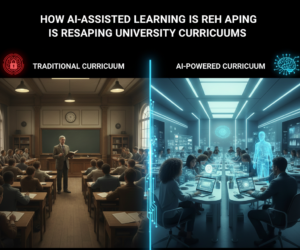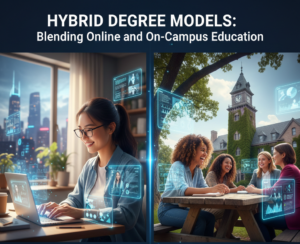Adaptive Learning Platforms: Customized Education at the University Level

Adaptive Learning Platforms: Customized Education at the University Level
What is Adaptive Learning, and How Does It Work?
The use of technology-driven systems that change the delivery of educational information depending on a student’s performance, learning style, and progress is referred to as adaptive learning. Adaptive platforms, which are different from conventional teaching techniques that use the same strategy for all students, customize the learning experience for each person, making sure that every student gets the assistance they need in order to be successful.
The Reason Universities Are Opting for Adaptive Platforms
Classes at the university level often feature a significant number of students from varied backgrounds, with varying levels of knowledge and different learning styles. Professors are confronted with the difficulty of striking a balance between curriculum requirements and the requirements of individual students. This gap may be bridged with the aid of systems that use adaptive learning, which use data-driven insights to customize educational experiences for students in real time.
A Look at the Functioning of Adaptive Platforms
Artificial intelligence and data analytics are the foundation of the majority of adaptive systems. The platform monitors the students’ answers as they engage with the learning modules, determines their strengths and weaknesses, and modifies the difficulty, tempo, or kind of information that is presented to them. Students who follow this approach are able to design a customized learning pathway that allows them to devote more time to the concepts that are difficult for them while also allowing them to progress through the subjects that they already understand at a faster pace.
Opportunities for Students
There are a number of benefits to using adaptive learning systems, including:
- Personalized Pathways: Students are given information that is custom-tailored to their own requirements for learning.
- Feedback in Real Time: Errors are identified as soon as possible, which allows for a quicker corrective process.
- Students who are given the opportunity to learn at their own pace experience less stress and have a better understanding of the material.
- Increased engagement: Interactive and personalized material serves to boost motivation.
Advantages for Faculty
Adaptive platforms provide lecturers and professors with really useful information:
- Insights Based on Data: Dashboards that update in real time spotlight the success of the class as well as the challenges faced by individual students.
- Effectiveness: Grading burdens are reduced with the use of automated assessments.
- Support That Is Targeted: Faculty members have the ability to concentrate their efforts on the students who need the greatest assistance.
- Flexibility of the Curriculum: In addition to lectures and seminars, professors have the option of including adaptable modules into their courses.
The Case of Large Lecture Courses
Adaptive learning systems make certain that no student gets overlooked in large lecture halls, where hundreds of students are taught by the same educator. The platform makes education more accessible and successful by providing personalized practice and evaluation, while the lecture gives a general overview of the subject matter.
Bridging the Gaps in Knowledge
Students at universities often come from a variety of educational institutions, nationalities, and intellectual backgrounds. These knowledge gaps are identified early on using adaptive platforms, and the coursework is then adjusted appropriately. For instance, a student who is having difficulty with the principles of mathematics in an engineering course may get focused practice without causing the remainder of the class to progress at a slower pace.
Providing Support for Learning Styles That Are Diverse
Visual aids are the most effective learning method for certain pupils, whilst other students would rather use written materials, simulations, or interactive exercises. It is possible for adaptive platforms to display information in a variety of formats, which allows for the distribution of content to be tailored to the tastes of each individual user. Inclusivity and accessibility are both expanded as a result of this flexibility.
Influence on Student Achievement and Retention
Universities who have implemented adaptive learning say that the course completion rates are greater and that the grades are better. These platforms help to lower the number of students who drop out and increase the confidence that students have in themselves, so making higher education more accessible to a greater variety of learners. They do this by correcting shortcomings as soon as they are identified and offering assistance on an ongoing basis.
Difficulties and Restrictions
In spite of the advantages that come with adaptive learning, it also presents a number of difficulties:
- Universities are required to spend in software, infrastructure, and training, which results in high implementation costs.
- Concerns Regarding Data Privacy: The performance data of students must be safeguarded.
- Excessive Dependence on Technology: Human contact should be enhanced by adaptive systems, not supplanted by them.
- Faculty training: Professors are required to get instruction on how to successfully use platforms into their lectures.
The Function of Professors in the Process of Adaptive Learning
The human component continues to be of the utmost importance, notwithstanding the presence of technological technologies. No algorithm can ever duplicate the mentoring, contextual knowledge, or critical thinking instruction that professors give. Adaptive learning allows professors to devote more of their time to student participation that is more meaningful by relieving them of the burden of recurrent grading assignments.
The Future of Adaptive Learning in Higher Education
Adaptive platforms will become more intuitive and ubiquitous as technology continues to advance. Systems will be able to anticipate students’ requirements before any problems develop because to its integration with artificial intelligence and predictive analytics. Adaptive learning, when combined with virtual reality and gamification, has the potential to revolutionize higher education by making it a more accessible, interesting, and individualized experience for students.
By tailoring learning routes to the individual, taking into account a variety of requirements, and providing assistance to students and teachers alike, adaptive learning platforms are revolutionizing university education. The increasing significance of obstacles, despite the fact that they continue to exist, indicates that higher education is moving in the direction of a model that is more focused on the student. It is anticipated that in the years to come, these systems will be essential instruments in determining the future of academic performance.




